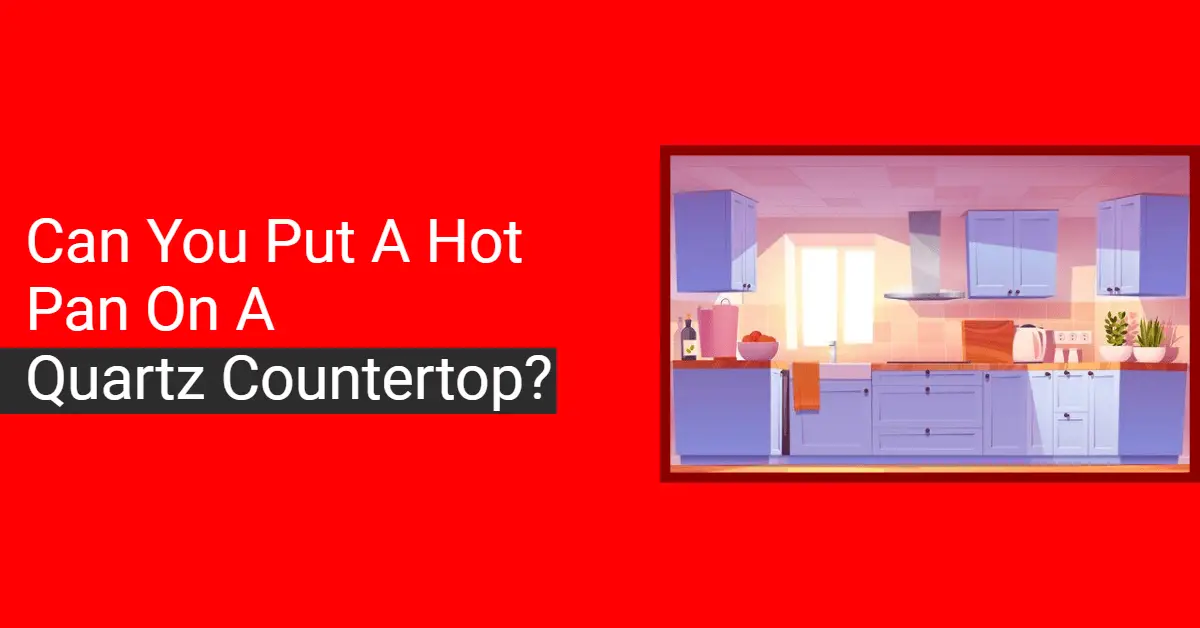Can You Put A Hot Pan On A Quartz Countertop? (Explained)
As with any countertop material, it’s always best to consult your manufacturer’s care instructions before setting a hot pan on your quartz countertop.
In general, however, quartz is heat-resistant and can withstand temperatures up to about 300 degrees Fahrenheit.
So as long as you’re not putting a blazing hot pot or pan directly on the surface, you should be fine.
Just use common sense and always use a trivet or hot pad to protect your countertop from excessive heat.

It typically responds well to heat, which is why it’s commonly used for ovens in kitchens, but those types of granite or marble will most likely suffer from hot-pan burns.
Because they don’t have the same natural strength and structure as their hard-rock counterparts.
If you do happen to set a hot pan on your quartz countertop and it leaves a mark, don’t panic.
Most Quartz countertops are made with a non-porous surface that won’t absorb stains or spills, so the mark should disappear on its own once the area cools down.
What if stains don’t disappear?
If the stain doesn’t disappear, you can try scrubbing it with a mild abrasive cleaner like Bon Ami or Bar Keepers Friend.
Just be sure to use a soft cloth or sponge and go easy on the scrubbing so you don’t damage the surface.
How quartz countertop is made?
Quartz countertops are made from a man-made material that is comprised of approximately 90% ground quartz and 10% polymer resins.
The Quartz is combined with the resins and pigments to create a slurry, which is then poured into Molds.
The Molds are placed under high pressure and heat, curing the countertops and giving them their final shape, size, and colour.
However, exposure to extreme heat can cause the countertop to discolour, so it’s important to use caution when setting hot pans or pots on the surface.
Always use a trivet or hot pad to protect your countertop from excessive heat.
What finish should I use on a quartz countertop to prevent it from spots caused by a hot pan?
A honed or matte finish will help to camouflage any potential heat spots on your quartz countertop.
The finish you choose for your quartz countertops will depend on how you want to use them.
There are two main types of finishes that you can choose from laminate and premium. Let’s discuss these two different types of finishes.
Laminate
Laminate is a thin layer of wood or plastic material that is usually textured and non-scratchy to the touch; it’s sometimes filled with a colorant, too.
The thin layer of laminate protects the surface underneath, but it doesn’t protect the surface very well against scuffs and scratches.
This type of finish is best suited for areas that don’t see a lot of traffic, such as bathrooms.
Premium finish
Premium finishes are much more durable and resistant to scuffs and scratches.
They’re typically made of thicker materials, such as granite or marble, and they provide a higher level of protection for your quartz countertop.
If you’re looking for a finish that can withstand a lot of wear and tear, the premium is the way to go.
Can I use a thickening product on a quartz surface to make it stronger and to prevent it from hot cookware?
Yes, there are some great products out there that you can use to thicken your surface and make it more durable, but they won’t help prevent cracking or other damage.
If you want a really strong quartz surface in an area that sees lots of traffic, you should consider installing an under-mount sink.
These sinks have a top lip, so it covers the edges of the countertop and provides an extra layer of protection from scuffing, scratching, and cracking.
What are some of the benefits of quartz?
Quartz is an extremely strong and durable material that is perfect for high-traffic areas in your home, such as kitchens and bathrooms.
It’s also heat-resistant, so you can set hot pans on it without worry. Quartz is also non-porous, so it won’t absorb spills or stains.
And because it’s manmade, you can find quartz countertops in a wide variety of colours and patterns to suit your style.
What are the disadvantages of quartz?
Quartz isn’t as affordable as some of the other countertop materials on the market, and it’s not as inexpensive as wood or linoleum, either.
Because quartz is a manmade material, it doesn’t have a natural grain like cherry or maple.
It’s also prone to cracking and chipping if you’re not careful with it.
While this countertop is more durable than others out there, it’s still prone to damage if you don’t take care of it properly.
It’s best to keep your countertops covered when they aren’t in use or install an undermount sink so that they don’t get exposed to unnecessary damage.
Final Thought
If you’re looking for a beautiful and durable countertop option for your home, quartz is a great choice.
Just be sure to keep it covered when not in use and take care not to damage it.
According to the National Kitchen and Bath Association, quartz can last up to 25 years if you take care of it properly.
However, most quartz countertops will wear out after about 10 years if you’re not careful with them.
That’s why it’s important to protect them from scratches, scuffing, and wear.
If you have any concerns about whether putting hot pot on it will damage your countertop, you should consult a professional.
As long as you take proper care of it, a quartz countertop can last for many years.
Just be sure to keep it clean and free of scratches, scuffs, and wear.
If you have any concerns about whether or not putting a hot pot on your countertop will damage it, you should consult a professional.

